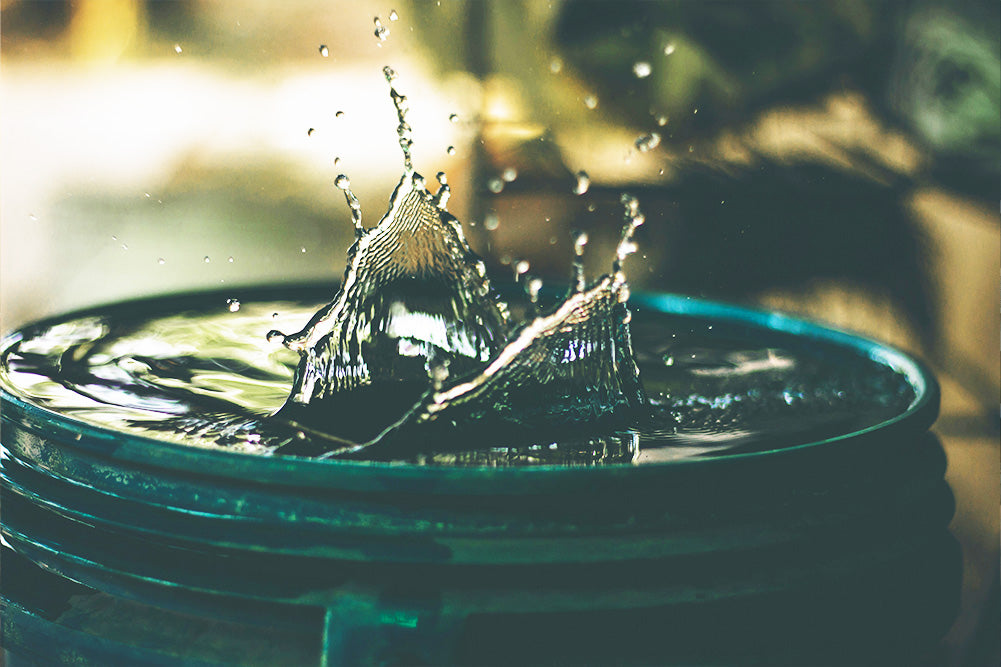Your Cart is Empty
May 30, 2024 4 min read

No matter your geographic location, there is a risk for a natural disaster. Whether it be drought or floods, hurricanes or earthquakes, or snowstorms or rainstorms, the elements are beyond human control. With that in mind, it is important to ensure you set aside water in case of emergency.
When it comes to the quantity of water you should store, your own space ultimately determines how much you are capable of storing. That being said, the CDC recommends storing “at least 1 gallon of water per person per day for 3 days for drinking and sanitation” (1). For a family of four, for example, this would be four gallons of water per day, for three days, or a total of 12 gallons of water. However, space permitting, they suggest storing a two week supply of water.
Keep in mind, pets, pregnancy, or illness all require more water intake. Living in hotter climates also demands more water to prevent dehydration.
There are two main options for storing water: buying bottled water and filling containers with water. As long as the expiration date is observed, the CDC endorses bottled water to be the safest (1). Bottled water is purified, and if kept unopened, there is no risk of microbial growth in the bottle. Bottled water should be stored in a cool, dry location, away from fertilizers, insecticides, or cleaning products. Heat allows vapors from these products to penetrate the thin plastic of a bottle, contaminating the water (2). Heat also may cause plastic leaching, the process of chemicals releasing from plastic products into the environment due to heat or acid exposure. When using bottled water to store water, be sure to check that the bottles are made from BPA non-leaching plastic.
Another option to store water is by filling containers with water to store. When choosing containers to store water in, look for FDA-approved food-grade containers. These can be found at most camping or surplus stores. These containers are not at risk of plastic leaching, and they will not transfer toxic substances into the water (1). Similar to bottled water, water containers should be kept in a cool area. This will prevent algae growth in the containers. Keep them off of concrete, as concrete heats up faster than most surfaces (3). Make sure these containers are airtight and not prone to rusting. Most water sources are chlorinated, but if not, add household bleach to your water to purify it. (Note: water coming from a public water supply is already chlorinated.)
Shelf life of your stored water depends on how it is stored. Typically, store bought water can be stored up to five years before it needs to be changed out (3). That being said, it is always important to check the expiration date on your water. If you are filling food-grade containers with public supply water, it is best to replace the water every six months for the best taste (1).
While storing bottled or containers of water is an adequate way of preparing for an emergency, it is not always practical. Storing water is bulky and takes up more space than many have available, especially because the space needs to be temperature-controlled for the most long-lasting water. Alternatively, investing in an emergency water filter allows any water to be life-saving water. Seychelle’s water filters are made from food-grade, non-leaching plastic designed for long-term use. They range from pitchers that filter 150 gallons of water to compact straws that filter 1,320 gallons of water, so you can be prepared for any emergency. Water filters made by Seychelle are independently lab-tested to remove up to 99.99% of harmful contaminants.
When it comes to emergency preparedness, it is never too early to gather supplies. Water is the most crucial item in any emergency supply kit, and it should be stored in a cool, dry environment. Bottled water can be stored for up to five years, while water filled in containers should be replaced every six months to preserve its freshness. For a longer-lasting, easily stored alternative, consider investing in a Seychelle water filter. These filters can be used on any freshwater source, no matter how contaminated, and they can ensure you will be drinking clean water, every time.
How long can you stockpile water?
The shelf-life of stockpiled water depends on the means of storage. Commercially bought water should be replaced every 5 years, while water stored in food-grade containers should be replaced every 6 months.
How do you store water for long term survival?
Water should be stored out of sunlight in a place where it will not get too hot. If possible, keep the water off of the floor, and always keep water directly off of concrete.
Can you store water for 5 years?
Yes. Bottled water can be stored for up to 5 years, but after that it should be replaced.
References